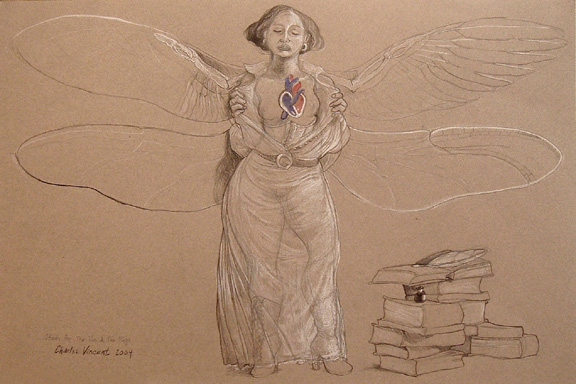American Idolatry

Drawing for The Heart, The Pen, And The Page – (c) 2004 Charles Vincent
The plan was that no matter what I did, how busy I was, what other commitments I had, I would write a play a day, every single day for a year. It would be about being present and being committed to the artistic process every single day, regardless of the “weather.” It became a daily meditation, a daily prayer celebrating the rich and strange process of a writing life.–Suzan-Lori Parks
In defense of playwright Suzan-Lori Parks and in reaction to a recent Guardian article skeptical of the 365 Plays/365 Days aesthetic, some dramaturgs on the discussion list sponsored by Literary Managers and Dramaturgs of the Americas are evoking an old partisan argument — that turf war that catalogs poor old Shakespeare with the “conventional†or “patriarchal†and places him on the wrong side of any upstart revolution in theatre. We Americans often feign the King’s English when we play-act an arrogant and pretentious manner or speech. The americano dramaturg of this particular comment sums up the essence of the argument but also shows how the British affectation is not absolutely necessary when talking down your nose to a nation of people.
“The Brits, bless ’em, have a problem accepting the new.â€
This straw-man argument is unhelpful toward exploring any aesthetic that might be at work in 365 Days/365 Plays. Suzan-Lori Parks has always resisted such simplistic approaches to discussions about her work, especially that talk which would so easily classify her as a “woman writer of color.†Any discussion on the dramaturgy should be put into context of her previous work and what she has already said and written about it. This Play-a-Day serial represents a significant departure for a playwright who before this time has always labored heavily within the writing process, most plays taking a minimum of three years to complete. So we should assume that the real grand inquisitor on the aesthetics of 365 Days/365 Plays to be the playwright herself.
Likely, a playwright of her rigor was found many a day laden in self-criticism and writer’s block. Consider the long day’s journey into night that produced the play in this series titled This Is Shit. Stage directions have an audience gather to watch a play. The character Program Thrower utters a single line. (No need to speculate on the line. Title says it all. Suzan-Lori Parks ends her short play where Alfred Jarry so famously began his.)

Although the title 365 Days/365 Plays doesn’t quite say it all, coupled with cover art for the paperback publication, it does say a great deal. The full glossy cover of this month’s American Theatre resembles any celebrity pop magazine. The cute black chick with dreadlocks and tattoos is cruising the American Theatre landscape in her red convertible. Blondie’s riding shotgun.
Theatre Communications Group (TCG) not only publishes the magazine but also the paperback of 365 Days/365 Plays to be released next month. The same “snapshot” is being used in each, except shotgun Blondie has been photoshopped out of the image used for the book cover.
Shotgun Blondie is Bonnie Metzgar, the former associate producer at New York’s Public Theater, and co-conspiritor with Parks and producer of the 365 Festival, destined to be “the largest shared world premiere in the history of the American Theater.” And if she and Parks can keep the PR engine of the red convertiable humming, this “festival” will also become the most expansive book tour in American Theatre publisher TCG’s history.
 Mostly we have been judging this book by its cover. Cover in the extended definition of the word. Once the hype of the nation-wide festival of 365 Days/365 Plays is no longer riding shotgun, providing cover and camouflage, the actual text will need to step out into the limelight of the American Idol challenge that has been manufactured for its debut. Expect the same polarization of opinion that the TV reality shows all generate. Hopefully the playwright had the prudence or “genius” in one of her 365 days to write the contra to her This Is Shit play.
Mostly we have been judging this book by its cover. Cover in the extended definition of the word. Once the hype of the nation-wide festival of 365 Days/365 Plays is no longer riding shotgun, providing cover and camouflage, the actual text will need to step out into the limelight of the American Idol challenge that has been manufactured for its debut. Expect the same polarization of opinion that the TV reality shows all generate. Hopefully the playwright had the prudence or “genius” in one of her 365 days to write the contra to her This Is Shit play.
The term “snapshot aesthetic” refers to a trend that began to influence fine art photography in America in the early 1960’s. The style featured careless compositions and banal everyday subjects, often presented as eccentrically juxtaposed sequences of photographs. Snapshots were taken by “artists” and hence deemed acceptable within certain sections of the fine art gallery system.
Pre-order 365 Days/365 Plays by Suzan-Lori Parks at Amazon.
“This Is Genius” –John D. and Catherine T. MacArthur
One thought on “American Idolatry”
Hi,
Thanks for linking to my site. It is interesting to see my drawing about writing on a page about writing, although I seem to have come in at the middle of an argument I have no familiarity with. A play whose stage directions include the audience assembling and then has one line? But you don’t say what the line is… may be it’s a quote of Beckett saying “repeat play”. Then the whole audience would be stuck in a loop. The same thing would happen if it was Elmo saying “again!” I know everybody is always comparing Beckett to Elmo these days, but I couldn’t resist.
Thanks again and enjoy your biting and your beer.
-Charles Vincent
http://www.charlesvincent.ca
Comments are closed.